|
Some Basics
Sexing rabbits is not really hard to do. You can usually do a good job identifying a buck from a doe, at least from the age of 3 weeks and on. An older buck is easy to identify. The head and body is generally more blocky than the doe. Does of the medium and large breeds often develop a fold of skin under their chins. This fold is called a dewlap. Older does are usually larger than bucks of the same breed. A buck's testicles can be seen on a hot day. The testicles must be kept at a certain temperature in order for sperm to be produced. The testicles descend further on hot days and are brought back toward the body on cool days. In this way their temperature is regulated. Determining the sex of an older rabbit from a distance is usually easy to do, keeping the above differences in mind. Before discussing close up sexual identification, let's go over some definitions.
Definitions
- Anus
- The round opening at the rearmost area of the rabbit, on the belly side, next to the tail. Its purpose is to eliminate solid waste from the body. In other words, it's where the poop comes out. It is an unsanitary hole. It can carry many types of germs.
- Buck
- The male Rabbit.
- Doe
- The female Rabbit.
- Penis
- The male's sexual organ. It is located next to the anus, a little further away from the tail. It is cylindrical in shape coming to a rounded point at the end. It has a dual purpose. It eliminates liquid waste from the body. In other words, it's where the pee (urine) comes out. The urine is normally sanitary, without germs. The penis has another purpose. That purpose is to release sperm into the doe's vagina so that the doe can produce baby bunnies.
- Testicles
- A male's sperm and hormone producing organs. These are elongated pink sacks on either side of the penis that descend from within the buck as he gets older. Normally the testicles are not visible until about 2 or more months of age. Their first appearance may vary, depending on the sexual maturity of the buck and the temperature.
- Vagina
- The female's sexual organ. It is somewhat like a slit and looks similar to the penis when you push down to identify it, but it can be easily distinguished from the penis because a penis does not normally have a slit (except in rare circumstances). The vagina also normally has visible blood vessels running down each side of the inside of the slit. The purpose of the vagina is to receive the sperm from the buck so that she can have bunnies. The vagina acts as the birth canal from which the babies are born and houses her urinary tract opening toward the front of the slit which allows her to urinate (pee).
- Vent Area
- The general area that includes the sex organs and anus.
To identify the sex of a rabbit at a closer range, you must hold the rabbit upside down. If done correctly, this hypnotizes the rabbit and makes it easier to examine. I always recommend wearing a long sleeve thick cloth jacket to avoid getting scratched by the rabbit. 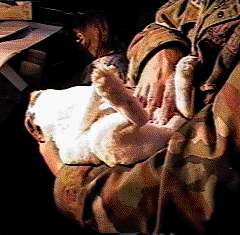 | With larger rabbits, you need to cradle them in one of your arms while you inspect their vent area. | 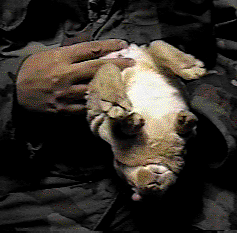 | With small rabbits, you can cradle them in one hand. | To determine the sex of the rabbit, use your forefinger and middle finger to press down the vent area just in front of the anus. In both the doe and buck, the area will protrude. The doe will display a slit or central line running up and down. Each side of the slit will be banded in pink. The buck, on the other hand, will display, if less than 5 weeks old, a blunt white tube without a central line. It will not have pink traversing either side of a center line. Older bucks will present a pink tube with a pointed end that resembles a bullet. With younger rabbits, you must look very closely to see the difference.
|
|---|
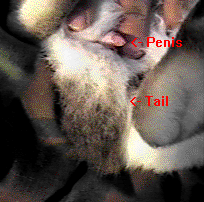 | 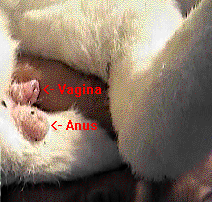 | | Buck Over 9 Months Old | Doe Over 9 Months Old |
|
|---|
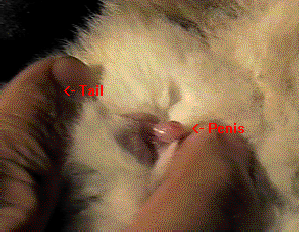 | 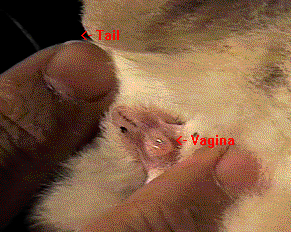 | | Buck 4 Weeks Old | Doe 4 Weeks Old |
|
|---|
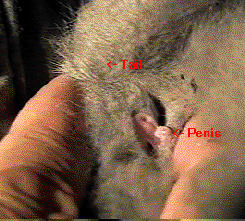 | 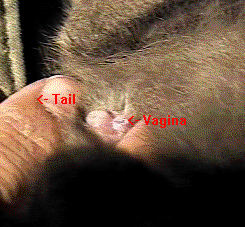 | Netherland Dwarf
Buck 3 Weeks Old | Netherland Dwarf
Doe 3 Weeks Old | |























No comments:
Post a Comment